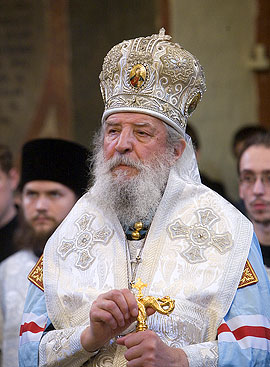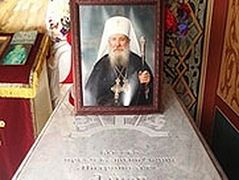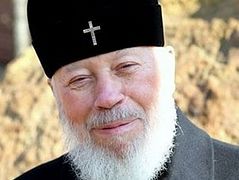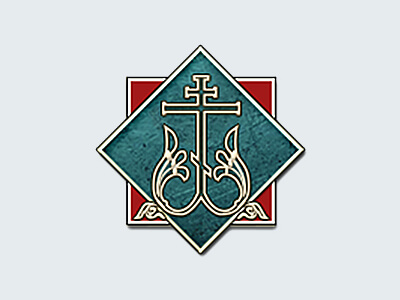 |
- Your Eminence: in May of this year, the long-awaited reunification of the two branches of the Russian Orthodox Church took place. Of course, the full meaning of this event can only be understood with time. How do you evaluate the results of the reestablishment of Eucharistic communion between the ROC and the ROCOR?
- In the reestablishment of ecclesiastical unity, the Lord "gave strength unto His people; the Lord blessed His people with peace . " This peace strengthens us in witnessing Christ, strengthens us in the service of the Church of Christ, in the preservation and dissemination of our Holy Russian ideals both in the Fatherland and beyond its borders. The main thing is to live in peace, help one another and support each other in the work of the Church, showing others the example of love, humility, patience and the good Christian life.
- The reestablishment of Eucharistic communion, which is expressed in joint divine services and Holy Communion from one Eucharistic chalice, is only the beginning of the reestablishment of full unity and understanding between the flock of the Russian Church in the Homeland and abroad. How do you view this unification?
- I hope that the unity we achieved, with God’s help, will help us, "in this adulterous and sinful generation," to keep the great legacy of the Russian Orthodox Church and of our ancestors, striving to live the testament of the Gospel. The main goal of the Russian Orthodox Church Outside of Russia is to preserve our faith, language and culture, which is infused with the spirituality of Holy Russia, speaking the truth about historical and contemporary Russia and in such a way serve and help her here in the West. We must not only preserve Russia and serve her in every way possible but we must share that which we possess with the Americans, Europeans, Australians, etc, who surround us. Church unity will help us preserve the living bond with our origins, with our own legacy, and this will help achieve the challenges we face.
- The path to the long-awaited unity was difficult enough: there was criticism heard frequently from both sides, some people expressed misunderstanding and rejection of the process of reunification. How real is this problem now for ROCOR and how do you see the path towards their resolution?
- The recent tour throughout the dioceses of the Russian Church Abroad of an official delegation of the Moscow Patriarchate, which accompanied the "Reigning" Icon of the Mother of God, and Sretensky Choir, which participated in festive divine services celebrating the reestablishment of the fullness of brotherly communion within the Russian Orthodox Church, brought a colossal benefit to all the children of our Church. This joint celebration, this common prayer before the Reigning Icon opened the eyes of many who resisted that which occurred on May 17, and those who doubted the correctness of our path were gladdened, encouraged and edified in the truth. With time, of course, our unity will grow strong, it will blossom and bear fruits, which, I hope, will convince those who have left the Church.
Correspondingly, it seems to me that our guests from Russia became convinced that we never departed from the Russian Orthodox Church, and always lived within her.
- What is ROCOR’s attitude towards the "Temporary Supreme Ecclesiastical Administration of ROCOR," created by Bishop Agathangel (Pashkovsky), who declared himself the President of the TSEA ROCOR?
- The Synod of Bishops suspended Bishop Agathangel from serving for his rebellion against his Ecclesiastical Hierarchy and for causing schism. Unfortunately, some, tempted by his behavior, followed him, thinking that in this way they are saving the Church, that is, it turns out to be "Sergianism" backwards. The late Patriarch Sergius is accused of trying to "save the Church" by establishing relations with the Soviet state. But the leaders of the so-called "TSEA ROCOR" turned completely away from the Church, trying to "save" her from the will of God, which has led us to reconciliation, unity and full communion. I would like to hope that many reject the path chosen by Vladyka Afathangel, when they see that this is not the work of God, of the Holy Fathers and Teachers of the Church. Those who remain in the TSEA ROCOR will later regret that they did not participate, did not join the process of the rebirth of the Russian Church and of our much-suffering people, that which St John of Shanghai and San Francisco and the founders of the Russian Church Abroad dreamt of, whose statements guided us as we studied the causes of the Russian church divisions.
- The group led by Anthony Orloff also calls itself the Russian Church Abroad. How does ROCOR view this?
- We cannot take the group headed by Orloff seriously. These are people who accuse everyone and everything of heresy and all sorts of sins, thereby justifying their canonically-tenuous situation as they dodge sanctions by their lawful Ecclesiastical Hierarchy. The leaders of this group are blinded by pride, self-regard, thirst for power and the need to play some sort of role. The head of this group, unfortunately, has no theological training, nor does he have a sense of the universal spirit of participating in the life of the entire Church of Christ, or the spirit of ecclesial catholicity. And this is reflected in all of his other "bishops" who have begun excommunicating each other, creating new "synods," etc. This is a clear sign of fatal schism. I pray that the Lord grant reason to these people who lead their flock astray.
- A so-called "True Orthodox Church" exists on the canonical territory of the Church in the Fatherland, headed by Tikhon Pasechnik. Is there a Synodal decision in ROCOR of the recognition or rejection of this group?
- In April of this year, the Synod of Bishops made a statement with regard to Tikhon Pasechnik in which we warned our clergy and laity of the utter uncanonical status of this group, calling upon those who doubted the benefit of ecclesiastical unity not to follow these schismatics. The essence of the matter is that this group was headed by the late Archbishop Lazar (Zhurbenko), who departed into schism and submitted to a group of individuals who seized control of Metropolitan Vitaly (Oustinov, +2006). Later they left them and formed their own "synod," committing several false episcopal consecrations. After his death, this group came to be headed by Pasechnik, who had been "consecrated" by Vladyka Lazar without Council approval by his lawful Ecclesiastical Hierarchy and while in schism. For this reason, we cannot in any way recognize this group, which has absolutely no ecclesiastical-canonical foundation supporting it. There is discipline within the Church of Christ, established by the canons of the Holy Fathers, the Ecumenical and Local Councils, which must guide us in our lives, for the sake of order and proper decorum.
- As we know, the Church Abroad consecrated bishops for several Old Calendar jurisdictions. What are the current relations with these jurisdictions after the reestablishment of unity of the Russian Orthodox Church?
- The Russian Orthodox Church Outside of Russia never officially participated in the episcopal consecrations of Old Calendar jurisdictions. These consecrations were performed by individual hierarchs who were members of our Council of Bishops of our Church, though Metropolitan Anastassy (Gribanovsky +1965) of blessed memory, the second of our Primates, was against recognizing these ordinations. Judging from the minutes of the meetings of the Synod of Bishops of the 1960’s, Metropolitan Anastassy spoke out against our interfering in the matters of the Greek Church and was inclined to subject those archpastors who participated in these consecrations to Spiritual Court. But he did not do that, limiting himself to a First-Hierarchal rebuke. Under Metropolitan Philaret (Voznesensky, +1985), these consecrations were nevertheless recognized, and then, later in the mid-1970’s, seeing the fragmentation of the Old Calendar Greeks, the Council of Bishops ceased prayerful communion with them.
Communion with the "Synod in Resistance" of Metropolitan Cyprian of Oropos and Fili was established by our Council of Bishops in 1994. Unfortunately, the Old Calendar movements in Greece, Bulgaria and Romania do not sympathize with the path we chose of reestablishing unity within the Russian Orthodox Church. Of course, I respect them for their love for traditional Orthodoxy, still, their stand will not bring them or the Ecumenical Church any benefit if they do not enter into dialogue with their Local Churches on regularizing the problems in the life of the Church. The Church always heeds the advice of those who preserve unity with her, overcoming problems and sorrows within her bosom, and suffering her pains.
- Your Eminence, the Lord bade you yourself together with His Holiness the Patriarch to execute the act which brought together the two parts of the one ecclesiastical organism which were forcefully separated; it was you yourself along with the archpastors and representatives of the clergy of the Church Abroad who entered into prayerful and Eucharistic communion with the Church in the Fatherland; you who celebrated Divine Liturgy in the Cathedral of Christ the Savior. What were impressions and reminiscences do you keep in your soul from this historic event?
- The divine services of those days reminded me of the words of the Psalm-singer, for in the process of dialogue, during the IV All-Diaspora Council and in the celebrations connected with the signing of the Act of Canonical Communion “Mercy and truth are met together; righteousness and peace have kissed each other.” Those days of prayer and brotherly communion also reminded me of the ancient icon of SS Peter and Paul who embrace and greet each other after reconciliation. And so the two parts of one Russian Orthodox Church, having embraced, kissed and greeted one another, joyfully, with great uplifting of the spirit, served, prayed and communed of one Chalice of Christ, victorious over the enemy of mankind, who in the difficult days of persecution, “smote the shepherd and scattered the sheep.”
- Doubtless, the reestablishment of communion will be reflected in all spheres of ecclesiastical life of the Russian diaspora. What in your view will the consequences of unity be for Holy Trinity Seminary?
- I hope that this will bolster positive cooperation and brotherly ties between our Seminary and the theological schools of the Moscow Patriarchate as well as other Local Orthodox Churches.
- Unfortunately, emigres of the first wave formed the backbone of ROCOR, and one by one they depart to eternity. To what extent are their successors, born in other ethno-lingual environs, able to preserve their national identity and what role, in Your Eminence’s opinion, does Orthodoxy serve in this area?
- In the difficult conditions of the diaspora, Russianness—that is, our Orthodox faith, the language and culture of our people—is preserved only within the Church, which has so far reared the growing generation in accordance with the spirit of the Church and of Holy Russia, nurturing within them love for the Church and the Fatherland. There are Russian church schools at our parishes, in which children learn the Law of God, Russian language, Russian history and literature; there are youth circles ministered to by priests. In the summer there are camps, and youth conferences are organized. If we continue to follow the example of the older emigres who educated us, who had fervent love for the Church, our history and culture, who created Russia Abroad; if we share this treasure, this beauty with our children and youth; if we live in everything we inherited from our ancestors, then I am certain that the Lord will help us ignite within our young people this love, or at the very least, we can plant within their hearts a good seed which will bring fruit.
- Dear Vladyka, the Lord blessed you to bear your episcopal podvig in the United States of America, where there are several Orthodox jurisdictions. What in your opinion is the fate of Orthodoxy in America within the context of the Act of Communion between the Moscow Patriarchate and the Russian Orthodox Church Outside of Russia, and what role does ROCOR play?
- Archbishop Vitaly (Maximenko, +1960) of blessed memory, who labored greatly for the sake of Russian Orthodoxy, first in Pochaev and the Carpathians, later in Russian America, would say that by becoming a bishop, he gave a promise to God “to apply all his energies to pacification within the Church.” I feel that we must follow his lead, that is, we must try to live in peace and do the work of God, witness Christ, “Serve the Lord with fear, and rejoice with trembling.” In unity lies our strength, our salvation. If we work together, carry forth God’s work, preach to all not only in word, but in deed, through good Christian life, brotherly love, peaceful coexistence, patience and humility, then God’s blessing His strength and aid will accompany us in serving Him and His people. I pray to God that we manifest this legacy of Abba Vitaly, who once headed our printing press.



